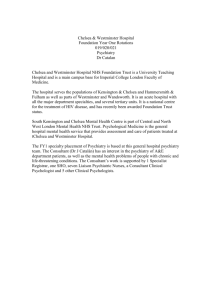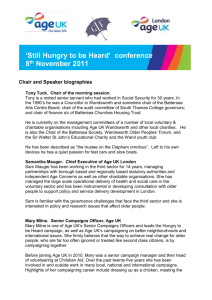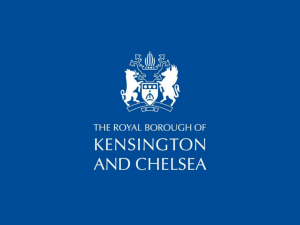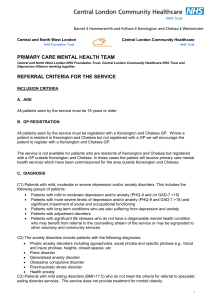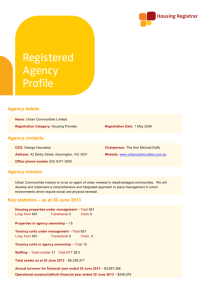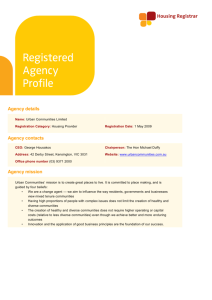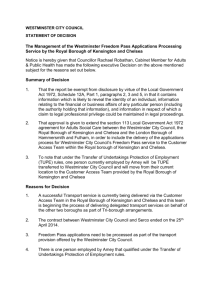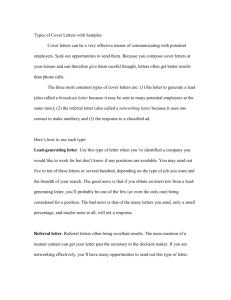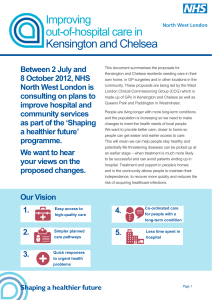June 2010 - Kensington & Chelsea Mind
advertisement
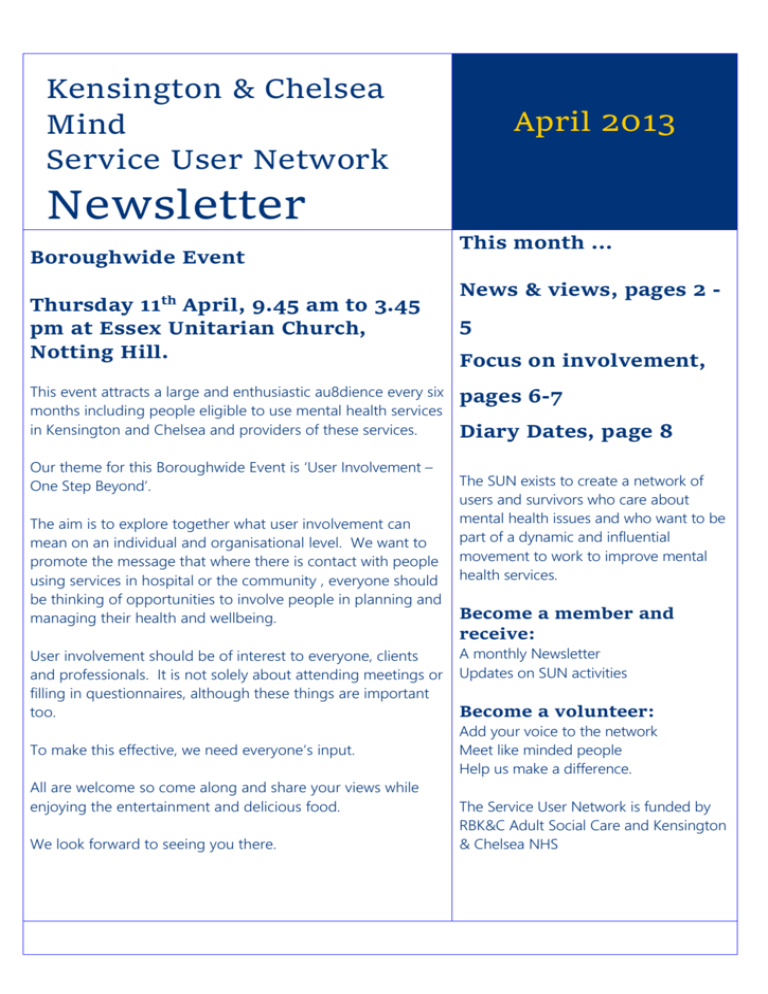
Kensington & Chelsea Mind Service User Network April 2013 Newsletter Boroughwide Event Thursday 11th April, 9.45 am to 3.45 pm at Essex Unitarian Church, Notting Hill. This event attracts a large and enthusiastic au8dience every six months including people eligible to use mental health services in Kensington and Chelsea and providers of these services. Our theme for this Boroughwide Event is ‘User Involvement – One Step Beyond’. The aim is to explore together what user involvement can mean on an individual and organisational level. We want to promote the message that where there is contact with people using services in hospital or the community , everyone should be thinking of opportunities to involve people in planning and managing their health and wellbeing. User involvement should be of interest to everyone, clients and professionals. It is not solely about attending meetings or filling in questionnaires, although these things are important too. To make this effective, we need everyone’s input. All are welcome so come along and share your views while enjoying the entertainment and delicious food. We look forward to seeing you there. This month … News & views, pages 2 5 Focus on involvement, pages 6-7 Diary Dates, page 8 The SUN exists to create a network of users and survivors who care about mental health issues and who want to be part of a dynamic and influential movement to work to improve mental health services. Become a member and receive: A monthly Newsletter Updates on SUN activities Become a volunteer: Add your voice to the network Meet like minded people Help us make a difference. The Service User Network is funded by RBK&C Adult Social Care and Kensington & Chelsea NHS News & views… page 2 Discriminatory mental health laws Launch of Healthwatch Kensington scrapped and Chelsea New legislation scraps outdated laws that discriminate against people with mental health problems. You may be aware that Kensington and Chelsea Local Involvement Network (LINk) was replaced by Local Healthwatch on April 1st. The Mental Health (Discrimination) Bill will now pass into law after completing its Parliamentary stages and put an end to archaic laws that interfere with the rights of people with mental health problems from participating in jury service and becoming or remaining a company director. Healthwatch will play a very similar role being an independent consumer champion for local health and social care services. It will also change a law that stipulates that MPs lose their seats if they are sectioned under the Mental Health Act for more than 6 months, even if they make a full recovery. Mental health charities have welcomed the passing of the Bill. Paul Jenkins, Chief Executive Officer of Rethink Mental Illness, said: “We are delighted that this bill has passed through Parliament. It's absurd that millions of capable, intelligent people have been excluded until now from key aspects of citizenship, simply because they have a mental illness. People with physical illnesses such as cancer would never be treated in this way. This Bill makes it clear that people with mental health illness can and should be able to contribute to society on an equal footing to everyone else.” Paul Farmer, Chief Executive of Mind, added: "Parliament has not just repealed antiquated rules that have no place in our society; it has send a clear message to the wider public that discrimination on mental health grounds will no A key difference is that local Healthwatch will feed into a national body called Healthwatch England ( you can visit this national website at www.healthwatch.co.uk). The local authorities have contracted Hestia as the host for the Hammersmith & Fulham and Kensington & Chelsea LINks to deliver local Healthwatch in these boroughs and also in Westminster forming a tri-borough structure called Healthwatch INWL You can contact local Healthwatch by emailing rbkclink@hestia.org or calling 020 8968 7049. The postal address is Freepost Plus RSRS-YUYJ-HECU, Hestia, Unit 25, 85 Barlby Rd, W10 6BN. If you would like to hear more about local Healthwatch, there are three upcoming launch events to choose from: Tuesday April 16th from 3.30 pm to 5.30pm in St Anne's, 55 Dean Street, Soho, W1D 6AF Thursday April 18th 2013 from 6 – 8 pm in St Paul’s, Queen Caroline Street, Hammersmith, W6 9PJ longer be tolerated. We are a step closer today to achieving true equality for the one in four of us who have mental health problems. Tuesday April 23rd from 11 am to 1 pm in Kensington Town Hall, Hornton Street, W8 7NX Contact the LINk office now to register your place. "We look across all parts of society where stigma is present to continue this quiet revolution - in the workplace, in public services and in education. This is a huge step forward, but we won't stop until everyone with a mental health problem gets the respect they deserve." News & views… page 3 Changes needed if CPA is to support recovery Leading mental health organisations have called for significant changes to be made to the Care Programme Approach (CPA) if it is to be effective in supporting service users in their recovery. The call was made by the Mental Health Foundation, in partnership with NSUN network for mental health, at the launch of a new report, Service users’ experiences of recovery under the 2008 Care Programme Approach. In a study for the report, participants including some from our SUN, highlighted a desire to move away from purely medical approaches to mental health care and more towards a whole-person approach. Perhaps more worryingly, the majority of participants who had been treated compulsorily under the Mental Health Act 2007 found that it had a negative effect on their recovery. The CPA was introduced by the Government in 1990 when long-stay psychiatric services were closed and is designed to ensure that community mental health services work well for service users. The latest version of the CPA, from 2008, is intended to provide support for mental health service users who have wide-ranging needs, or are particularly at risk. It is especially important, Key points included: Recovery means different things to different service users and this needs taking fully into account. Services are patchy in this respect Service users who may face particular disadvantages in society often receive less helpful approaches and services. African, African Caribbean and female participants were especially concerned about this It is not helpful if medical diagnoses are the only explanations of mental distress provided, but this is too often the case Service users want warm, human qualities from mental health professionals to have at least as much focus as actual services and for there to be an increased move away from purely medical approaches to whole-person approaches While it is important to service users to feel safe, services can be too bound up with risk issues. Other important aspects of people’s lives are then overlooked Most participants who had been treated compulsorily under the Mental Health Act 2007 found that it had a negative effect on their recovery and that there was a tension between such powers and Government emphases on choice and empowerment Participants wanted to be more involved in their care plans and, frequently, to influence strategic decisions about services as well therefore, that services provided under the CPA are of high quality. Shortfalls in staffing and funding need addressing if the 2008 CPA is to work well for service users. The study for the report took place between September 2011 and late February 2012 as a result of service users’ concerns about the support that they were receiving under the CPA. Service users’ experiences of recovery under the 2008 Care Programme Approach can be The two researchers had personal experience of using mental health services and the 81 participants had all received services under the 2008 CPA. Hard copies of the report cost in the region of £10 and can be obtained by calling 020 7803 1100. downloaded free of charge at http://www.mentalhealth.org.uk/publications. SUN members can view a copy at our office. The report highlights a number of key issues raised in the study. News & views … page 4 Mental health services must improve care, say CQC Experts seek urgent investment in mental health Mental health services must do more to ensure that the care they provide to patients in hospitals is based on individual needs. The Care Quality Commission’s (CQC) Mental Health Act Annual Report found that 15% of people receiving care under the Act are not being involved in the decisions made about their care. Additionally, 37% of care plans checked showed no evidence of involvement of the person who had been sectioned. The report also found that the number of people subject to the Mental Health Act (MHA) is rising. With evidence suggesting that mental health problems increase during recession due to service cuts, new guidance from the Joint Commissioning Panel for Mental Health says that investing in effective treatment, prevention and promotion leads to significant economic savings even in the short-term. Other key findings in the report included: Services are under increasing pressure, especially in regards to the provision of Approved Mental Health Professionals who contribute to decisions about the detention of patients under the Act. Other areas showing evidence of pressure on services are transport to hospital wards, increased demand for beds, increased workloads and access to psychological therapies MHA commissioners are concerned about cultures of control and containment that are enforced over all detained patients. 45% of patient records reviewed still showed no evidence of consent to treatment discussions before being given medication There is a significant gap between the practice CQC observes and the ambitions of national mental health policy. The Joint Commissioning Panel is made up of organisations including the Royal College of Psychiatrists (RCPsych) and the Royal College of General Practitioners. Guidance co-author Dr Jonathan Campion, from the RCPsych, said: “Local commissioners and Health and Wellbeing Boards now have an opportunity to assess the size and costs of gaps in local provision for treatment and prevention of mental health problems as well as the promotion of wellbeing. “This guidance outlines a range of cost effective ways of treating and preventing mental health problems as well as enhancing wellbeing.” With only a minority of people who require help actually receiving it, the guidance explains how local communities can determine: The report did note that some hospitals and wards are doing a very good job in treating patients with dignity and respect and, for the first time, it highlights specific examples of good practice. Paul Farmer, chief executive of Mind, referring to the rise in detentions and CTOs said : “The Government says it is keen to do more to How many people have mental health problems, including those from higher risk groups The risk factors for mental health problems – and protective factors for wellbeing The proportion of people who would benefit from services to treat and prevent mental health problems and promote wellbeing compared to those who actually receive them – and the cost of this unmet need The type of interventions which can best treat and prevent mental health problems as well promote wellbeing Likely outcomes from taking action, including economic savings. improve mental health services across the board. This report shows just how far there is to go in many areas and raises serious concerns about how realistic it is to expect improvements while services are so overstretched.” The guidance highlights a range of cost-effective interventions, which have been shown to make a difference. For instance, the London School of Economics has estimated that promoting mental health at work results in net savings of £10 for each £1 spent even after one year. News & views … page 5 Peer supporters wanted Community Development Team who are part of a charity called Certitude also known as Fanon based in Brent, have been commissioned by NHS Brent to support people experiencing mental ill-health and their families by delivering a range of recovery based pilot projects and programmes with a focus RBKC Housing Strategy (Older People) “Delivering improved accommodation based services for older people is required to maintain the health, independence and dignity of older people, reduce admissions to nursing and residential care services and encourage downsizing from family- on black and minority ethnic communities to inform future commissioning of services. They are currently in the process of piloting an Inpatient Peer Support Programme in partnership with CNWL, Park Royal Centre for Mental Health Tamarind Centre and voluntary sector mental health organisations. They are now looking to reecruit Peer Support Workers (PSW) with lived experience of mental health issues who are able to use their own recovery experience to support others being discharged from inpatient psychiatric care. These individuals need: Previous experience of using mental health services and or have been in inpatient psychiatric care. To participate in the 8 days City & Guilds accredited training provided To commit five months to the project from May to October 2013 Live in Brent or border with Brent Successful participants will be paid £20 for two hours per week over twelve weeks and up to £20 additional expenses If would like to find out more about the peer support programme please contact Mina Kakaiya, Community Development Worker by emailing MKakaiya@certitude.org.uk or calling by calling her on 020 883 01 776 or mobile number 0771 804 2760. sized accommodation”. The Royal Borough of Kensington and Chelsea has developed a strategy outlining proposals to meet the demands on housing and accommodation with care services arising from an ageing population, provide improved housing choices for older people whether they are home owners, private tenants or rent a home from the Council or a housing association and improve the quality of residential and nursing care accommodation in the borough. You are invited to offer your views on the strategy. The consultation period ends on Friday 10th May. You can access details of the strategy and a short questionnaire online at: http://www.rbkc.gov.uk/housing.aspx Alternatively, if you would like more information you can contact Claire Wise on 020 7361 3328. Benefits & work Benefits and Work is an online resource that provides useful guides and up to date information about benefits. They offer step-by-step guides to give you the best possible chance of getting your legal entitlement. You can subscribe to a free fortnightly bulletin which is a source of benefits news & information. You can subscribe by visiting their website at http://www.benefitsandwork.co.uk. The application form and relevant information is also available at the SUN office if you would like us to email it to you. The closing date for applications is 24th April. Focus on user involvement … page 6 BBC Three Mental Health Documentary looking for BME contributors Clinical Reference Groups: Patient and Carer Recruitment The NHS Commissioning Board (NHS CB) has BBC Three’s upcoming mental health season will feature a documentary investigating support and treatment available to young people aged 16-30 with a diagnosed mental health condition. They are looking for people to talk about their experience of mental health services including barriers in accessing these. This could be in any capacity, such as experience of GP’s, children’s & adult services, accident & emergency, or psychiatric units. According to a 2010 report, over two-thirds of Black and Minority Ethnic (BME) respondents surveyed felt they were unable to access the mental health support they needed at an early stage. opened the application process for patient and carer members of its 74 Clinical Reference Groups (CRGs) for 2013/14. Participants would first have a telephone conversation with the programme’s producer to hear more and to help you decide if you want to take part. If so, the director, Colin State, would arrange to meet at a suitable location and at an appropriate time. He would probably film a short piece to camera at this stage. With the contributor’s consent this would then be shown to the programme’s executive at the BBC. The closing date for applications for membership is 26th April. Once the executive give the go-ahead, the producers would then ask the contributor to visit their GP to get a letter of consent to say they feel they are happy for them to appear in the programme. Once this is complete the producers will arrange to schedule an interview with the participant for the documentary. Peer workers unite The producers have arranged for all contributors to take part, if they want, in a “mindfulness retreat” on the weekend of 19th April in the Lake District. Contact Jonny Benjamin, Reporter & Researcher, Nine Lives Media, Invicta House, 2 – 4 Atkinson Street, Manchester M3 3HH on 0161 832 2007 or 07890 508 523. Email jonny.benjamin@ninelivesmedia.co.uk. Website www.ninelivesmedia.co.uk. CRGs are responsible for providing the NHS CB with clinical advice regarding specialised services, and for promoting equity of access to high quality services for all patients, regardless of where they live. The Guide to CRGs and Information Pack for Patients and Carers, which are available via the contact details below, will provide you with more, detailed information about their work. To find out more about becoming a patient or carer member of one of these groups, you can call 0300 311 22 33 (Weekdays from 8am to 6 pm) or access the relevant website at http://www.england.nhs.uk or Charity Together’s Peer2Peer Network links peer workers to share information and learning. To facilitate this, they share information, thoughts and news exchanged at the Peer2Peer Steering Group meetings as well as communications amongst Peer2Peer Network members. If you are interested and want to find out more about the Peer2PeerNetwork contact Daniel Eichner by calling him on 020 7780 7316 or emailing him at daniel-eichner@together-uk.org. Focus on user involvement … page 7 Patient-led assessments of the care environment (PLACE) Have you received social care in the past year? Good environments matter. Every NHS patient should be cared for with compassion and dignity in a clean, safe environment. Where standards fall short, they should be able to draw it to the attention of managers and hold the service to account. Community Care, the social work magazine and website, is looking for mental health service-users who have had experience of receiving social care under the new payment-by-results system over the past year. This month sees the introduction of PLACE, which is the new system for assessing the quality of the patient environment, replacing the old Patient Environment Action Team (PEAT) inspections. The assessments will apply to hospitals, hospices and day treatment centres providing NHS funded care. This work means local people go into hospitals as part of teams to gauge how the environment supports patients’ privacy and dignity, food, cleanliness and building maintenance. It focuses entirely on the care environment and does not cover clinical care provision or how well staff are doing their job. The assessments will take place every year, and results will be reported publicly to help drive improvements in the care environment. The results will show how hospitals are performing nationally and locally. Assessment teams are a partnership between staff and patient assessors. Ttherefore patients must make up at least 50% of the assessment team. Anyone who uses the service can be a patient assessor, including current patients, their family and visitors, carers, patient advocates or patient council members. If you are interested in becoming a patient assessor, please contact Kensington and Chelsea LINk (Healthwatch), Unit 25, Shaftesbury Centre 85 Barlby Road, W10 6BN. Call 020 8968 6771 or email rbkclink@hestia.org. Journalist Alex Turner says: 'My piece is focusing on the impact payment-by-results has had on frontline mental health social work over the last 12 months, and in particular whether it's moving focus negatively towards cost and outcomes at the expense of patients and their needs. Most of the article will be based on the experience of practitioners, but it'd be great to get some impression of service-user feedback in terms of whether the system has improved care for individuals, or if social workers' concerns seem to be reflected by their clients.' Contact Alex direct by calling 07872 943523 or emailing misteralexturner@gmail.com if you can help and give social workers a service-user's perspective. SUN Members’ Meeting 18th April SUN members often ask about access to psychological or talking treatments. These treatments can help people overcome or better manage emotional difficulties. They work by providing an opportunity for you to talk in a way that helps you to understand yourself better. Having gained this understanding, you can work out ways of living your life in a more positive and constructive way. Counselling provides an opportunity to talk about whatever is troubling you, and to be heard. The counsellor's most important skill is the ability to listen: the aim is not to tell you what to do, or to offer a personal opinion, but to help you to arrive at your own solutions so that you can move forward. Website: http://www.rbkclink.org Alternatively, you can contact your local hospital’s Volunteer Coordinator. Come along on Thursday 18th April at 2 pm to hear staff from help Counselling Centre talk about the services they offer. We will also provide details on other talking therapy services in the borough (see page 8 for venue details). Diary dates … page 8 Help us make a difference – Attend SUN members’ meetings and/or join a SUN project group Why not join us at our monthly meetings and/or become a volunteer and put your skills to use in influencing change while learning new skills? You are very welcome to attend any of these meetings. If you can, please let us know if you are planning to come along. For details on how to get involved, call Aidan Moloney on 020 8964 1333 ext 8 or email sun@kcmind.org.uk. Event Date and time Venue SUN March Members’ Meeting Thursday 18th April 2 – 4.15 pm Migrant & Refugee Communities Forum, 2 Thorpe Close, W10 5XL SUN Volunteer Induction Monday 22nd April 10. 30 am - noon Meeting Room Kensington and Chelsea Mind SUN BME Group Monday 22nd April 2.30 – 4 pm Meeting Room Kensington and Chelsea Mind SUN Activities & Events Planning Group Thursday 25th April 10.30 am - noon Meeting Room Kensington and Chelsea Mind SUN Newsletter Editorial Group Friday 26th April 10.30 – noon Meeting Room Kensington and Chelsea Mind SUN Office Support Group Friday 26th April 2 – 4 pm Meeting Room Kensington and Chelsea Mind SUN Campaigns & Debates Group Tuesday 30th April 2.30 am – 4 pm Meeting Room Kensington and Chelsea Mind Disclaimer: All views expressed in this newsletter are not necessarily the views of Mind or its Service User Network. The opinions expressed are the opinions of individual contributors and organisations. Also, Mind is not responsible for the quality of any external service highlighted in Newsletter articles. Kensington & Chelsea Mind Service User Network Office 8, 7 Thorpe Close, London, W10 5XL Telephone 020 8964 1333 extension 8 Email sun@kcmind.org.uk Website www.kcmind.org.uk
